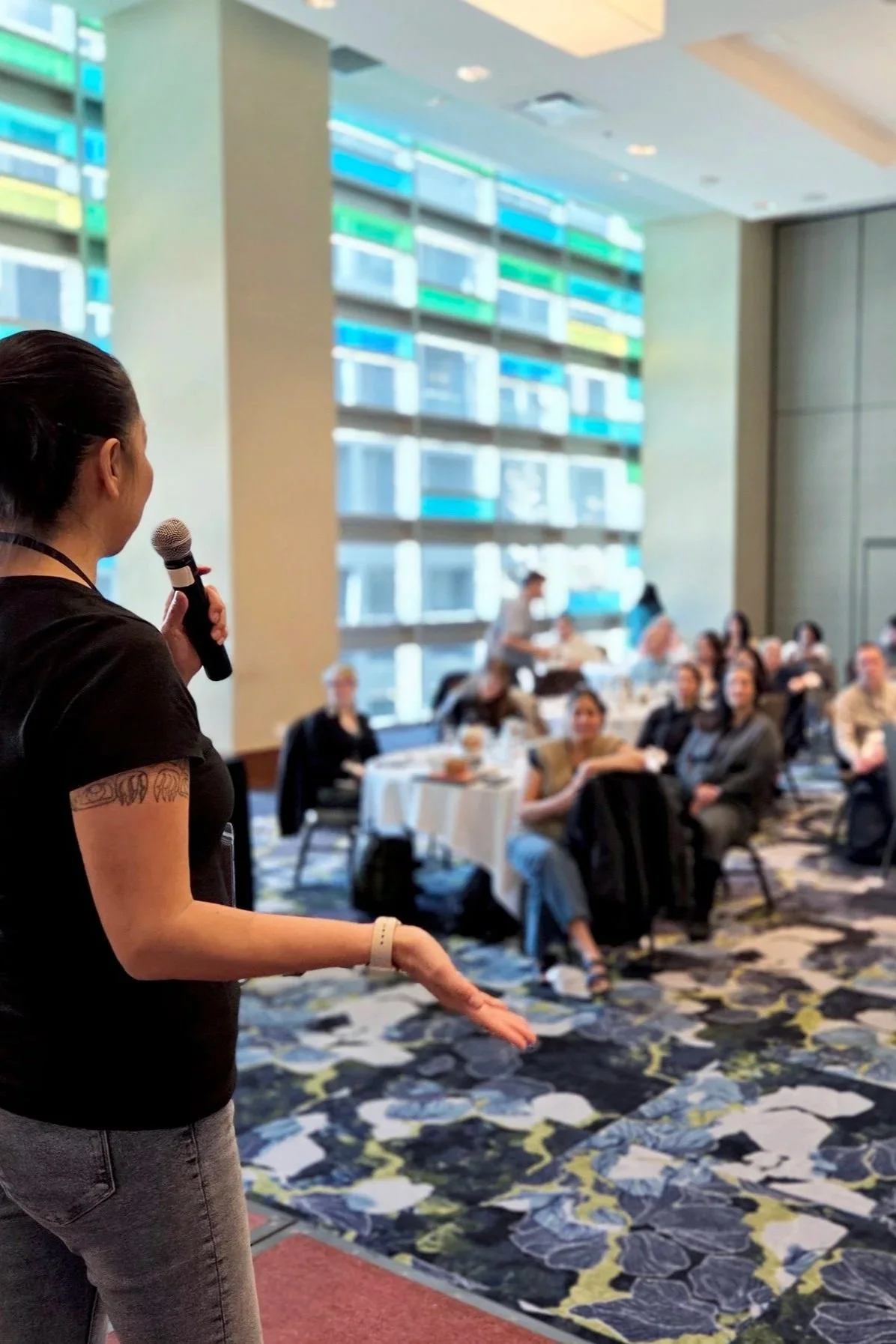Cultivating Safe Spaces
Train the Trainer
Virtual 1-Day Train the Trainer
The Virtual CSS Train the Trainer is a live, small-cohort session (3–12 people) with live facilitation/or delivered by one of our Level 3 Master CSS Facilitators, focused on practice-based facilitation and nervous system regulation. You’ll learn to teach CSS responsibly, hold tension without harm, and integrate relational leadership tools into your own work.
Saturday, March 28, 2026
Wednesday, July 8, 2026
Saturday, October 17, 2026
Saturday, December 12, 2026
In-Person 1-Day Train the Trainer
The In-Person CSS Train the Trainer is a full-day, immersive learning experience focused on relational leadership, emotional safety, and practical facilitation skills. Limit to 14 trainees. A deeper, community-based training that combines facilitation, reflection, and feedback.
June 4, 2026 in Penticton, British Columbia
Self-Paced Train the Trainer eCourse
Launching January 2026, this self-paced eCourse offers structured learning with demonstration videos, reflection exercises, and facilitator support. It’s ideal for people who want to integrate CSS into their practice or leadership while learning on their own schedule.
Coming 2026
Private Organizational Train the Trainer Cohorts
For Nations and Enterprises. Bring CSS into your organization and build internal capacity. The Private Organizational Train the Trainer Cohorts supports organizations, Nations, and systems leaders in embedding CSS across departments, teams, and projects.
Talk to one of our team members about becoming a CSS Facilitator, email admin@naqsmist.com
Who It’s For
This program supports people who want to:
Offer CSS in their own work
Trainers, educators, consultants, and practitioners who want to integrate CSS into their leadership or facilitation.
Build internal capacity
Organizations, teams, departments, and Nations wanting CSS embedded across their systems.
Deepen personal practice
People who want to live the framework daily — not as theory, but as a grounded way of leading, communicating, and relating.
CSS TtT meets you where you are.
Whether you teach, lead, support, or advise, this program strengthens your ability to work with more regulation, steadiness, and integrity.
What CSS Train the Trainer Is
CSS Train the Trainer (TtT) prepares leaders, educators, practitioners, and anyone who supports people to facilitate the Cultivating Safe Spaces (CSS) framework in their own settings - classrooms, communities, organizations, Nations, and systems.
This isn’t presentation coaching, it’s practice-based, meaning you learn to embody the framework:
cultivating safety
holding accountability
teaching the Four Necessary Conditions, Protocols, and Perspectives
staying steady in high-pressure environments
About the CSS Train the Trainer
Level 1 — CSS Intro Facilitator
Delivers the 5-hour Intro to CSS workshop.
Level 2 — CSS Advanced Facilitator
Customizes CSS workshops for diverse audiences.
Level 3 — CSS Master Facilitator
Mentors others, develops resources, and leads advanced sessions.
What You’ll Learn
By completing Train the Trainer, you will learn to:
Teach the CSS framework responsibly and clearly
Facilitate difficult conversations without collapse or reaction
Guide relational repair after harm
Stay regulated while holding groups
Bring CSS principles into teams, departments, and systems
Expectations
This work carries responsibility. We expect facilitators to:
Arrive grounded, prepared, and open.
Demonstrate emotional regulation under pressure.
Use the framework with attribution and integrity.
Reflect and repair when needed, without blame or avoidance.
How to Get Started
Individuals
Apply to Become a Facilitator → [Application Link]
Complete the Intro to CSS
Attend a Virtual, In-Person, or Self-Paced Intensive.
Organizations / Nations
Contact Wynette Weenk → wynette@naqsmist.com
Collaborate with Naqsmist to design a custom cohort.
Implement CSS internally with mentor pathways and system supports.
Frequently Asked Questions
-
Self-Paced eCourse (Online): Learn at your own pace with videos, reflections, and assignments. Includes feedback check-ins and certification review. Investment: $3,500
1-Day Intensive (Virtual - Live Zoom): Small cohort (2–4 people) led by one of our Level 3 Master CSS Facilitators. Includes live facilitation practice, feedback, and certification assessment. Investment: $3,800
1-Day Intensive (In Person -Penticton, BC + rotating hosts): Live, full-day facilitation with one of our Level 3 Master CSS Facilitators. Includes practice, peer coaching, and certification assessment. Investment: $4,250
-
The program is for people who want to teach, integrate, or live the CSS framework in their own practice, organization, or daily leadership. Some participants bring CSS into classrooms or community learning. Others use it inside their organizations for ongoing relational work. Many simply want to embody the framework personally to lead, parent, or work with more steadiness, accountability, and care.
-
It helps, but it’s not required. We’re not looking for polished presenters, we’re looking for people who can hold space, stay regulated under pressure, and stay connected to themselves and others in difficult moments.
-
Certification recognizes that you can teach and model CSS responsibly, not that you’ve memorized the material. The CSS Train the Trainer gives you Level 1 Certification. Once you've delivered the training, you may apply for Level 2 and 3.
Each level builds on the last:
Level 1 — Intro Facilitator: delivers the 5-hour Intro to CSS workshop.
Level 2 — Advanced Facilitator: customizes for different audiences and contexts.
Level 3 — Master Facilitator: mentors others and supports CSS integrity at the systems level.
-
Certification recognizes that you can teach and model CSS responsibly, not that you’ve memorized the material. The CSS Train the Trainer gives you Level 1 Certification. Once you've delivered the training, you may apply for Level 2 and 3.
Each level builds on the last:Level 1 — Intro Facilitator: delivers the 5-hour Intro to CSS workshop.
Level 2 — Advanced Facilitator: customizes for different audiences and contexts.
Level 3 — Master Facilitator: mentors others and supports CSS integrity at the systems level.
-
Yes. We recommend completing both the Intro to CSS and Enhanced CSS Add-On eCourses before the Train the Trainer. However, only the Intro to CSS is required before applying. They provide the grounding you’ll need to teach and model the framework with integrity.
-
CSS isn’t about delivering content, it’s about living the content. You’ll be trained to model emotional regulation, accountability, and relational safety in every room you lead. We don’t hand you a script; we help you embody a way of teaching that strengthens trust and communication, even under pressure.
-
Naqsmist doesn’t police facilitators we trust them to uphold their own integrity and accountability. If you have a concern, we encourage you to address it directly and relationally. This framework is designed to help us have uncomfortable conversations, not avoid them behind policy or authority.
-
Most participants complete Level 1 Certification after one intensive (virtual or in-person) and required pre-work. Level 2 and 3 certifications come through continued practice, mentorship, and deeper facilitation experience.
-
Yes. Certified facilitators are invited into ongoing learning and mentorship spaces, access updated materials, and stay connected through Naqsmist’s relational leadership community. We host two monthly calls with our CSS Facilitator Community.
-
No, and that’s intentional. We choose not to pursue formal academic or institutional accreditation because CSS is a living, relational framework, not a standardized curriculum.
Accreditation often requires fixed content, rigid assessment, and external control over what and how we teach. That model doesn’t fit a framework rooted in Indigenous Knowledges, lived experience, and relational accountability.
Instead, our certification process emphasizes practice, embodiment, and integrity and how you carry the work, not just how you perform it. Facilitators are certified through demonstrated understanding, relational capacity, and consistent alignment with the CSS teachings.






